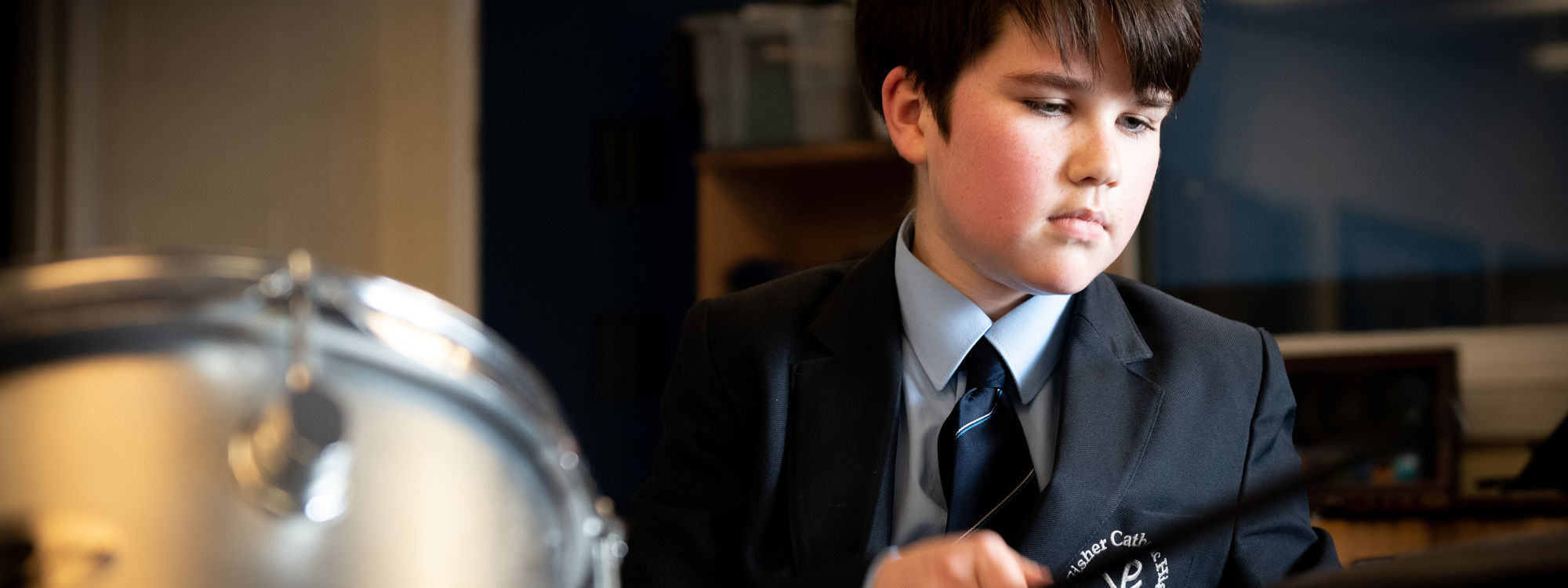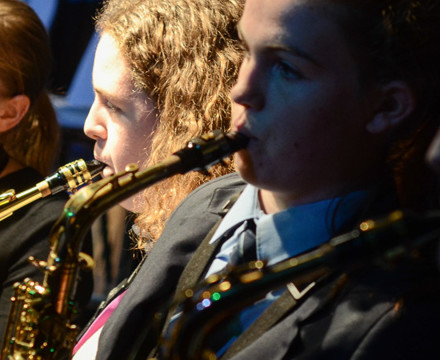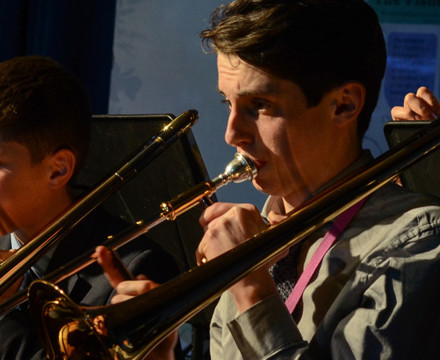- Home
- A Place of Learning
- Subjects Offered
- Music
Music
It is well recognised that music can help to develop the skills, attitudes and attributes that can support learning in other national curriculum subjects. As part of the school’s aim to ‘Educate for Life’, we provide an ambitious and challenging Music curriculum for students throughout their time at St. John Fisher that achieves and goes beyond the requirements of the statutory National Curriculum at Key Stage 3. With a wide range of abilities ranging from those with no musical experience to highly experienced musicians, our curriculum is designed to provide enjoyment, develop confidence, learn how to read and write music, perform on musical instruments, work together, use music technology and prepare for later learning, be it at GCSE or A Level.
This learning includes listening skills, the ability to concentrate, creativity, intuitions, aesthetic sensitivity, perseverance, the ability to work in a group, self-confidence and sensitivity towards others.
St. John Fisher values music highly and sees it as an integral part of the school curriculum. This is also reflected in the large numbers of students who engage in instrumental lessons and take part in the wide range of extra-curricular ensembles. We are a premier partner of Harrogate International Festivals and students can sign up to their Library of Live scheme that provides unique learning experiences and free concerts. The wide range of ensembles that students can partake in enriches and supports our curriculum with their high standard giving students the opportunity to develop as musicians and perform in situations that give them lifelong experiences.
At Key Stage 3, music is about providing opportunity to learn new skills and centres on six key units of which each have their own focus on two or more elements of music. By the end of Key Stage 3, all students will have had the opportunity to explore reading and writing music, learn about orchestral instrument and their characteristics, how to write and form melodies, the function of harmony in song writing, different types of textures and how all elements combine to create music works. We sing regularly and have made provision for this to be increased following the guidance around vocal work during the covid pandemic. Our curriculum is sequenced in order of both understanding and importance. For example, the core elements of music, such as rhythm and dynamics, are taught first as these are both the easiest to access and form the basis of all music. The increase in difficulty around elements such as harmony and texture are approached later when students have grasped and performed using key elements.
We study a wide range of genres, contexts and styles across both Key Stage 3 and 4 and value the knowledge that varying musical interests promote an all-round musician. This also helps us to engage a wider range of young people and caters for their tastes in an ever-developing musical picture. This ranges from music of great history such as the Blues and classical composers to popular music and musical theatre. We also utilise many of the pieces in the Approaches to Listening section of the model National Curriculum.
At Key Stage 4, we follow AQA GCSE (8271) with students studying 2 units per half term with two different teachers. Following on from Key Stage 4, these units are divided up into composition, performing and appraising with a focus on the elements of music for each unit.
We aim to provide every student with the opportunity to learn at their own pace and develop their skills as a musician through listening, composition and performance in curriculum time and, if they so wish, in instrumental lessons and ensembles. In assessment, we aim not just to assess summatively at the end of a unit, but provide an opportunity for performance and to demonstrate creativity. Assessment in music is continuous and takes place throughout all of our units.
We also aim to provide a level of teaching which caters for the needs of learners who are at any point in their musical journey. Sequenced knowledge is a key part of our teaching and the natural steps we take through learning music reflect those that are used in the learning of a musical instrument. Our units relate closely to each other and progress from one to the next by building on prior knowledge and expanding on key concepts. Through high expectations in all lessons, we aim to promote good learning habits and encourage concentration, focus and hard work.
Learning Journey Year 7
Learning Journey Year 8
Learning Journey Year 9
Learning Journey Year 10
Learning Journey Year 11 (2024-2025)
Instrumental Lessons
St. John Fisher can provide instrumental lessons in everything from Ukulele to Tambourine! With a dedicated team of peripatetic teachers who work closely with the department, we employ our teachers directly and not through another provider, ensuring the best quality of teaching possible.
Instrumental lessons should be applied for online using the folllowing link, where parents and carers can find all the information they need.



